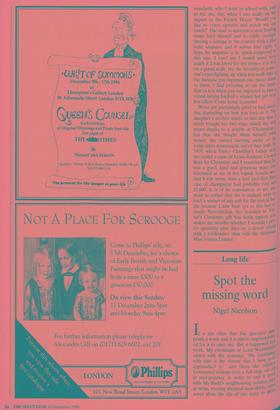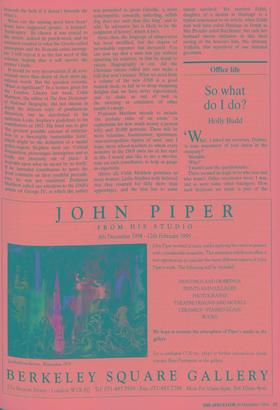Long life
Spot the missing word
Nigel Nicolson
Iis not often that The Spectator oils' prints a word, and it is almost unprecedent- ed for it to omit one. But it happened last week. My encomium of Lord Weidenfeld ended with the sentence, 'My friendshIP with him is the closest that I have ever approached to', and there the cotton!! terminated without even a full-stop, cut otr. in mid-sentence in order to end it le.vett with Ms Budd's neighbouring column, lust as twins, wearing identical mini-skirts, Trots never allow the slip of one sister to slwvi beneath the hem if it doesn't beneath the other's.
What can the missing word have been? Some have suggested 'genius', 'a leopard', bankruptcy'. By chance it was crucial to the article, indeed its punch-word, and its omission resulted in what the Greeks called aposiopesis and the Romans coitus interrup- tus. I will repeat it as the last word of this column, hoping that it will survive the printer's knife.
It Would be very inconvenient if all testi- monials were thus shorn of their most sig- nificant words. But the question remains, What is significant?' In a lecture given for the London Library last week, Cohn Matthew, the editor of The New Dictionary of National Biography, did not discuss in depth the delicate topic of posthumous discretion, but he distributed to his audience Leslie Stephen's guidelines to his Fontributors in 1882. His brief was to give the greatest possible amount of informa- tion in a thoroughly businesslike form', Which might be the definition of a model 1)911ce-report. Stephen went on: 'Critical disquisition, picturesque description and so forth, are obviously out of place.' It depends upon what he meant by 'so forth'. If he intended contributors to spare the dead comment on their youthful peccadil- loes, he was not consistent. Professor Matthew called our attention to the DNB's article on George IV, in which the author was permitted to quote Greville, 'a more contemptible, cowardly, unfeeling, selfish dog does not exist than this king', and to add, 'In substance this is likely to be the judgment of history', which it isn't. Since then, the language of vituperation has been modified, but the degree of permissible exposure has increased. You can now say that a man was gay without upsetting his relatives, or that he drank to excess. Hagiography is out. All the Christian virtues rolled into one make a ball that won't bounce. What we need from a volume of the new DNB is a good bedside book, to lull us to sleep imagining delights that we have never experienced, and to shake us out of bed in the morning in emulation of other people's energy. Professor Matthew intends to include 'the probate value of an estate' (a euphemism for how much money a person left), and 10,000 portraits. There will be more scientists, businessmen, sportsmen, 'non-metropolitan figures of note' and, I hope, more school-teachers to whom every nominee in the DNB owes his or her start in life. I would also like to see a two-line note on each contributor, to help us gauge its objectivity. Above all, Colin Matthew promises us more women. Leslie Stephen truly believed that they counted for little more than appendages, and the bias has to some extent survived. 'He married Edith, daughter of a dentist in Hastings' is a typical conclusion to an article, when Edith may well have ruled Hastings as firmly as Mrs Proudie ruled Barchester, but only her husband merits inclusion in this final sieving of the honours lists, this ultimate Valhalla, this repository of our national greatness.



































































 Previous page
Previous page